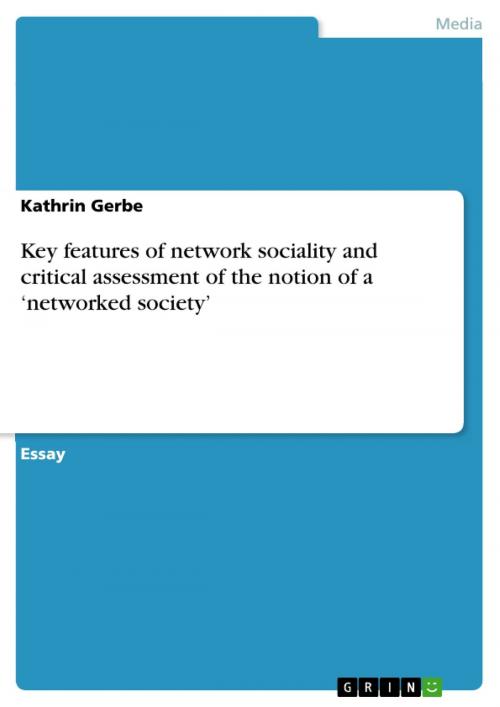| Author: | Kathrin Gerbe | ISBN: | 9783638785426 |
| Publisher: | GRIN Publishing | Publication: | June 9, 2007 |
| Imprint: | GRIN Publishing | Language: | English |
| Author: | Kathrin Gerbe |
| ISBN: | 9783638785426 |
| Publisher: | GRIN Publishing |
| Publication: | June 9, 2007 |
| Imprint: | GRIN Publishing |
| Language: | English |
Essay from the year 2007 in the subject Communications - Mass Media, grade: 1,3, University of Newcastle upon Tyne, course: Media Analysis, 17 entries in the bibliography, language: English, abstract: On an ordinary day, we are woken up by our mobile phone; we get up and check our emails, answer them, call somebody, chat with a total stranger on ICQ, and have a video chat with some friends overseas. Our social relations seem more and more dominated by communication technologies and have assumed a wider dimension as our contacts spread in networks around the globe. Companies, nations and individuals come together, making '[t]he 21st century ... the age of networks' (v. Dijk 2006). This essay discusses the key features of network sociality and the debates around the concept of network society, focussing on the influence of internet use on social interaction particularly in form of virtual communities.
Essay from the year 2007 in the subject Communications - Mass Media, grade: 1,3, University of Newcastle upon Tyne, course: Media Analysis, 17 entries in the bibliography, language: English, abstract: On an ordinary day, we are woken up by our mobile phone; we get up and check our emails, answer them, call somebody, chat with a total stranger on ICQ, and have a video chat with some friends overseas. Our social relations seem more and more dominated by communication technologies and have assumed a wider dimension as our contacts spread in networks around the globe. Companies, nations and individuals come together, making '[t]he 21st century ... the age of networks' (v. Dijk 2006). This essay discusses the key features of network sociality and the debates around the concept of network society, focussing on the influence of internet use on social interaction particularly in form of virtual communities.















